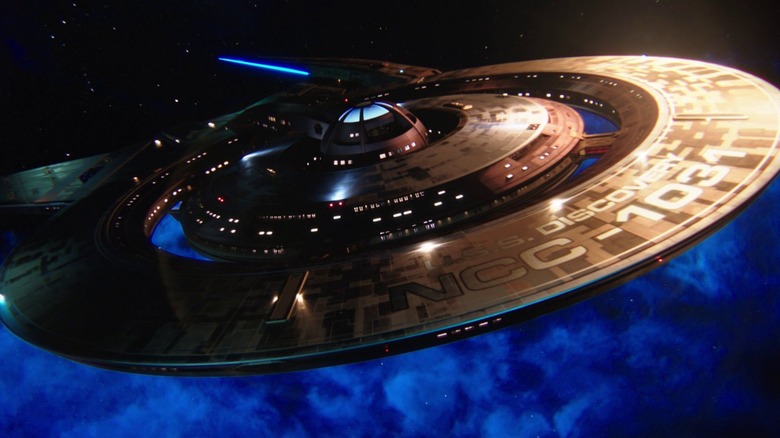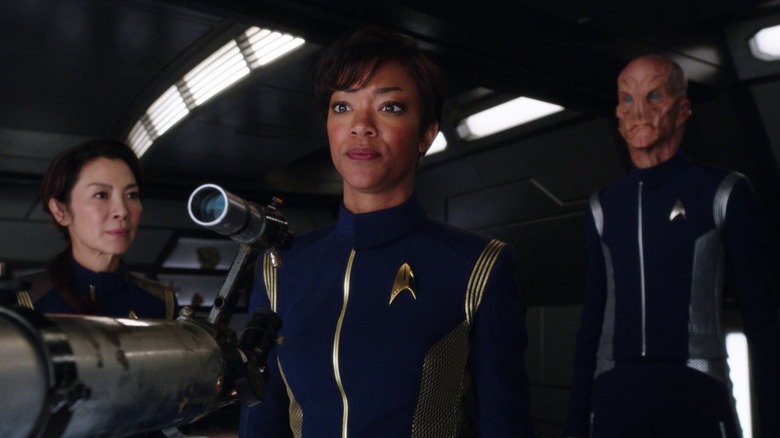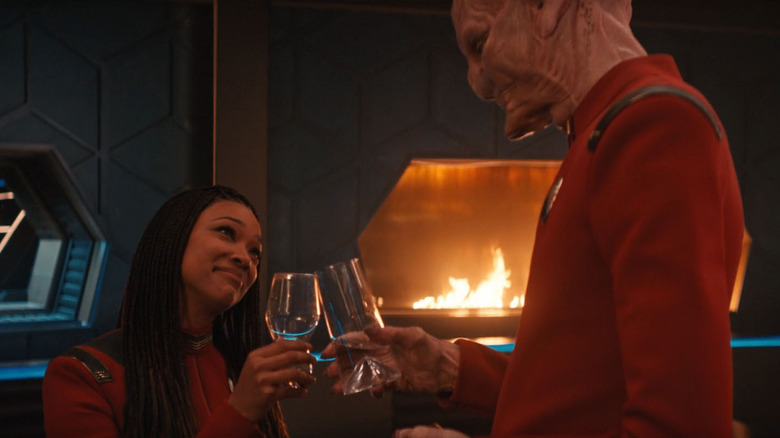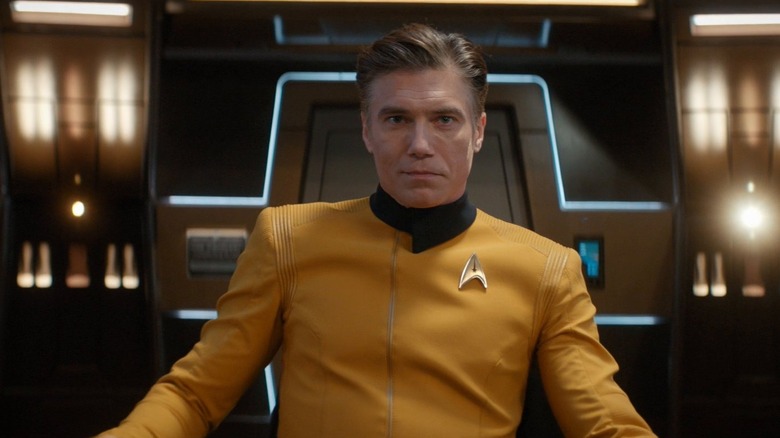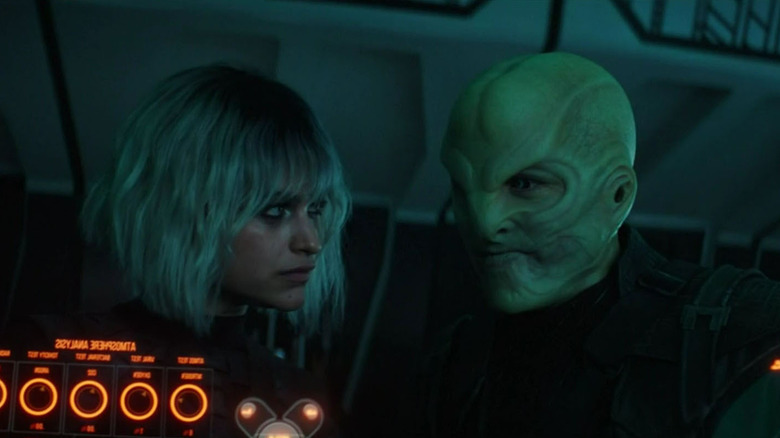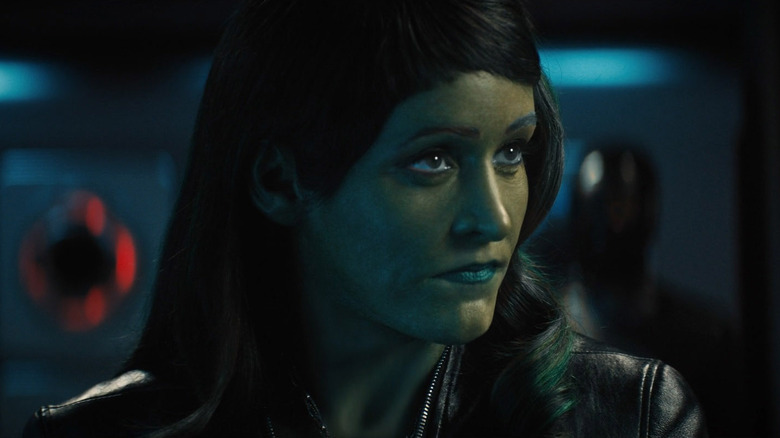Every Star Trek Discovery Season Ranked From Worst To Best
"Star Trek: Discovery" debuted on CBS All Access on September 24, 2017, marking the proud return of "Star Trek" to the small screen after a 12-year hiatus. As it was initially conceived by Bryan Fuller, the concept for "Discovery" was intriguing. It was to take place across the entire history of "Star Trek," with each season serving as a standalone story. The first season was to be a prequel to the original "Star Trek" series, the second was to be concurrent with the original series, the third was to be concurrent with "Star Trek: The Next Generation" (set a century later), and the seasons beyond would be in the far-off future.
"Discovery" cleaved to that idea, kind of. Fuller left the show before it aired and everything was reworked multiple times. The chronology of "Discovery" ended up being a little wonky, with the series undergoing a massive reboot at the beginning of its third season. The first two years of "Discovery" were set only a few years before the events of the original "Star Trek," while its later seasons threw the title ship forward in time to the 32nd century, almost a millennium ahead. The show ended up lasting five years, but never quite reached its full potential nor really told wholly effective stories. It was clear that fellow creator Alex Kurtzman was more keen on violence and mysteries than he was with the utopian ideals of Gene Roddenberry's original series. There were many interesting ideas in "Discovery," but the writing was rarely strong enough to explore them effectively.
The lead character of "Discovery" was Michael Burnham (Sonequa Martin-Green), the first officer of the U.S.S. Shenzhou who, over the course of her career, became the captain of the U.S.S. Discovery. The ship itself, in a novel "Trek" twist, had access to unique teleportation technology that could bamf the entire vessel instantaneously to any point in the galaxy. Its five seasons were inconsistent, but each has something worth discussing.
5. Season 1 (2017)
No "Star Trek" series, with the possible exception of "Star Trek: Strange New Worlds," ever began well. The first two seasons of "Next Generation" were notoriously rocky, and even the first season of "Deep Space Nine" took a while to find its footing. "Discovery" is no exception, boasting a first season that feels rushed and wonky.
The first season details Michael Burnham's involvement in a war between the Federation and the Klingons, and her express fault for its beginning. While being transported back to Starfleet Headquarters for a court-martial, Burnham is taken on board the U.S.S. Discovery, a science vessel with an onboard mycologist, Lieutenant Stamets (Anthony Rapp), who recently discovered a galaxy-wide network of interdimensional spores (!). Stamets finds a way to tie the ship's engines into it, letting it teleport anywhere. He effectively finds a way to trek without actually trekking.
The first season also saw a redesign of the Klingons, which was rather controversial at the time, and it took a bizarre sojourn to the evil Mirror Universe, keeping the Discovery out of the war for an extended period. Michelle Yeoh has fun as a cannibalistic tyrant from the Mirror Universe, although she's clearly having more fun than we are. Oh, and Harry Mudd (Rainn Wilson), a whimsical antagonist from the original series, returns to cause trouble.
The thought of a ship that can teleport is intriguing, and its existence would fundamentally alter the very nature of "Star Trek." Sadly, the writers of "Discovery" become too focused on action, violence, and balls-to-the-wall panic to stop and ponder it. The season is inappropriately action-packed and stuffed full of unearned emotional climaxes. Then, even though she started a war, Burnham is let off the hook. It's a bad season of TV.
4. Season 4 (2021)
The fourth season of "Discovery" saw a lot of emotional developments for its characters. It's certainly the best season for Saru (Doug Jones), the best character on the series. Saru is made the captain of the Discovery in season 4, marking a major change for him. It had previously been established that Saru's species, the Kelpiens, had been raised as a food source by a more aggressive species. He had evolved to live in fear and to sense when death was near. Also, he had been taught that if his species wasn't slaughtered by a certain age, they would mutate into predators, killing everyone around them. Once freed from his homeworld, though, Saru found that he didn't mutate into a predator. Indeed, he began to develop a sense of agency. By the show's fifth and final season, he even learned to fall in love.
Sadly, Saru's arc isn't interesting enough to save season 4 from a dull story that it merely repeated from its third season. In season 4, there has been a galaxy-wide gravitational cataclysm that the Discovery has to investigate. They ultimately find it was unwittingly perpetrated by a previously unknown alien species called Species 10-C, an enormous race of xenophobic tentacle monsters that were merely trying to set up a security field around their planet. Species 10-C certainly reminds viewers of the heptapods from Denis Villeneuve's "Arrival," complete with communication issues. The problem with the story is that season 3 also involved a galaxy-wide cataclysm — called "The Burn" — that was unwittingly perpetrated by an innocent alien just trying to defend itself. The entire mystery is a little obvious from the jump, and watching Michael Burnham slowly figure it out is uninteresting.
3. Season 2 (2019)
The second season of "Discovery" seemed like a prolonged panic maneuver. Perhaps sensing that old school Trekkies weren't on board for the first season, the showrunners freaked out and immediately brought back a whole panoply of known "Star Trek" icons. The season began with the reintroduction of the U.S.S. Enterprise and a story that heavily involves Spock (Ethan Peck). On this series, Spock is Michael Burnham's big brother since she was raised by Spock's parents. The second season of "Discovery" is set between the events of the original "Star Trek" pilot, "The Cage," and the first episode with Kirk (William Shatner), so it also restages aliens and worlds that Trekkies already know.
It's pandering, sure, but at least the legacy characters are fun. Captain Pike (Anson Mount) is super charming, and Number One (Rebecca Romijn) brings a new, ultra-logical spin to the character. The legacy characters were popular enough to warrant their own series, "Strange New Worlds," which has emerged as one of the better "Star Trek" shows in recent years. We have the second season of "Discovery" to thank for it.
Sadly, the story arc of season 2 is just as dumb and scattered as the first. The U.S.S. Discovery has to investigate a mysterious Red Angel, which has been leaving strange spatial readings all over the known galaxy. They find that it's a time traveler. Also, there's an evil machine intelligence, called Control, and the Discovery is forced to flee through a time portal into the distant future to kill it. It doesn't make any sense, it's poorly structured, and the violence levels remain too high.
2. Season 5 (2024)
The fifth and final season of "Star Trek: Discovery" serves largely as a sequel to the "Star Trek: The Next Generation" episode "The Chase." In that episode, the Enterprise-D discover that most humanoid species in the galaxy share a common, very ancient ancestor who seeded thousands of world with their DNA trillions of years ago. Michael Burnham, now operating in the 32nd century, finds that some wicked mercenaries, named Moll and L'Ak (Eve Harlow and Elias Toufexis), are after a new techno-widget made by the same ancestors and who follow a very similar set of ancient clues. The adventure to find the techno-widget is a rote "Indiana Jones" adventure.
By this season, the series is barely "Star Trek" anymore, affecting a broad action-and-adventure tone more reminiscent of "Star Wars." While stodgy old Trekkies like me may miss the slower, more philosophical tone of Old World Trek, at least the fifth season of "Discovery" drops the pretense. This is a bold adventure show about racing around, firing weapons, and dispatching bad guys. It's not what Trekkies signed up for, but it's a decent action program regardless.
Also, the characters have all been around long enough to be readily understood, and it's nice to see Saru go through a romantic arc. Also also, a quick pan over the cast reveals a wildly healthy amount of queer characters on the show. There's a queer couple, a trans character, a nonbinary character, and more. Does it end satisfyingly? Not really; the showrunners didn't know until the last minute that season 5 would be their final, but at least the season's story concludes and all loose ends are wrapped up.
1. Season 3 (2020)
The third season of "Star Trek: Discovery" should have been its first. As mentioned, the second season involves the U.S.S. Discovery being pulled through a time portal over 900 years into the distant future. The crew arrive at a time when the Federation has fallen apart thanks to The Burn, a cataclysm that, in a flash, destroyed almost all the space-faring ships in the galaxy. Starfleet barely survived, and a few stragglers went into hiding. The galaxy is now overseen by the Emerald Chain, a vicious band of money-grubbing gangsters who have reinstated capitalism. Naturally, extortion, slavery, and corruption came back with it. The U.S.S. Discovery, armed with millennium-old technology, has to traverse this new, mysterious galaxy. It's a place where life on Earth is dramatically different, and values have been flipped. Does the Discovery crew's integrity mean anything in this century, a century when they are forgotten? Or does it mean everything?
The season still suffers from rushed-sounding writing, and it's still frustrating that every character is a violent murderer (Michael Burnham shoots so many people!). Also, the investigation into The Burn doesn't warrant a terribly interesting conclusion. But, for the first time in the show's history, the characters actually do "Star Trek" stuff. That is, they undertake diplomatic efforts and talk about their values in a way that applies to the situation. "Discovery" could easily have dispensed with its first two seasons and begun right here, with a ship lost in time. The time jump also explains away why all the other "Star Trek" ships haven't been equipped with the Discovery's teleportation tech: No one remembers the Discovery because it fled into the future. It's a handy-dandy Band-Aid that this Trekkie appreciates.
